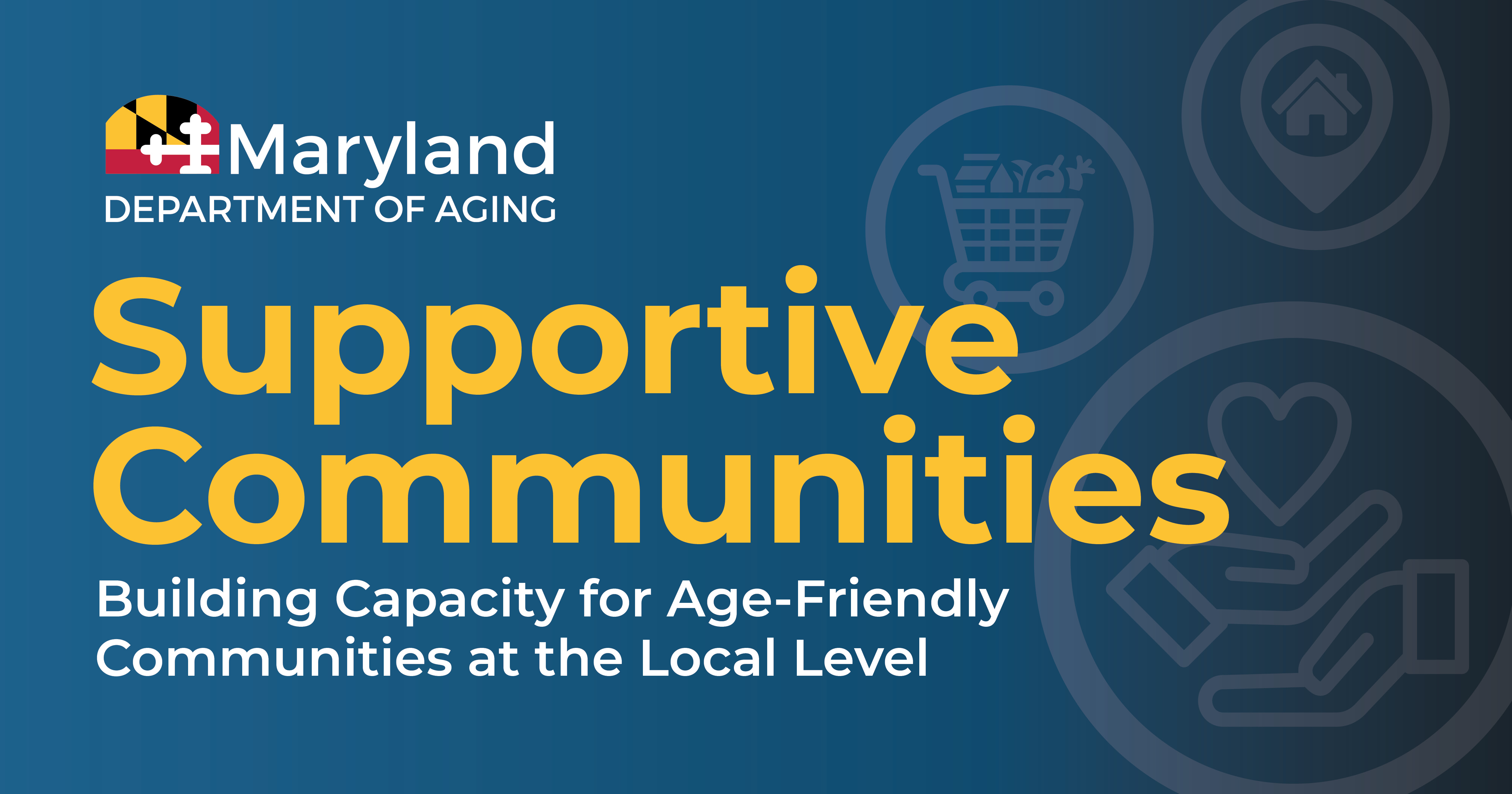
Empowering Communities to Meet the Needs of Aging Populations
The Supportive Communities program is an initiative aimed at creating age-friendly communities where older adults can thrive by supporting local governments, nonprofit organizations, businesses, and community members that serve older adults. The role of the Supportive Communities program is to:
- Advocate for policy changes that support older adults
- Allocate resources to help meet the transportation, housing, social activity, and other needs of older adults
- Engage communities on the needs, planning, and impact of age-friendly initiatives
Key Initiatives
Aging-in-Place Grants: This opportunity is part of the Department’s strategy to increase the resources and capacity for local Area Agencies on Aging, Senior Villages, and nonprofit organizations serving older Marylanders and their caregivers to provide high-quality services and supports, develop social connection, and foster community engagement, enabling older Marylanders to thrive in their communities. MDOA has awarded $261,173 to 11 organizations in FY26 grants to help older adults in Maryland live healthy, financially secure, purposeful, and socially connected lives in their own homes and communities. The grant awardees in FY26 include:
- Home Ports (Kent County): Received $45,000 to provide transportation and social programs for older adults in rural areas.
- Yad Yehuda (Montgomery County): Received $40,000 to create a support network for older Orthodox Jewish widows to help reduce social isolation.
- Laurel Advocacy and Referral Services (Prince George's County): Received $40,000 for its "LARS On the Go" program, which provides mobile food delivery, care coordination, and a community garden.
- Maryland Nonprofits (Statewide): Received $30,000 to help other nonprofits better plan for future challenges in serving older adults.
- Live Together, Inc. (Allegany County): Received $21,075 to create a county-wide master plan for aging services.
- St. Mary's Outreach Center (Baltimore City): Received $20,000 to provide comprehensive support, case management, and social activities for low-income older adults in the Hampden-Medfield area.
- Making Change, Inc. (Howard County): Received $15,971 to offer financial and housing counseling to low-income older adults.
- Worcester Commission on Aging (Worcester County): Received $15,000 to support local Village projects, including caregiver support programs.
- Tamarack Triangle Village (Montgomery County): Received $13,080 to help start a new neighbor-driven volunteer network that allows older residents to age in their own homes.
- Winter Growth, Inc. (Howard & Montgomery Counties): Received $11,546 to develop interactive online resources for caregivers in partnership with Empowering the Ages.
- Chesapeake Housing Mission (Lower Eastern Shore): Received $9,500 to build wheelchair ramps and make homes safer and more accessible for low-income older adults.
Naturally Occurring Retirement Communities (NORC): A neighborhood or housing development where a large percentage of residents have aged in place, meaning they've lived there long enough to become predominantly older adults. These communities aren't specifically designed for older people but evolve as residents age in place or younger residents move out. MDOA has awarded $1.3 million in state funds to 7 community-based organizations to provide programming, service coordination, and community support to concentrated areas where low-income older adults face problems of declining health, isolation, financial hardship, and language barriers. NORC encompasses three complementary projects—Elder Abuse Prevention, Holocaust Survivors Program, and Traditional NORC (the aging-in-place concept)—each tailored to meet the specific needs of older adults across the state of Maryland. FY26 grantees include:
Miriam Kelty Aging and Senior Social Connection Hub and Spoke Pilot Program: This bill establishes the Miriam Kelty Aging and Senior Social Connection Hub and Spoke Pilot Program in MDOA. The goal of the program is to support villages that take advantage of operational proficiencies and existing systems, skills, and resources to expand services to more residents in the geographic region. MDOA must select the Montgomery County Village Consortium to implement the pilot program for a three-year period.
Village Support and Expansion Projects: The Village concept provides a holistic approach to aging in place by addressing the practical, social, and emotional needs of older adults within a supportive community framework. It empowers older adults to maintain their independence, dignity, and sense of belonging as they navigate the challenges and opportunities of aging.